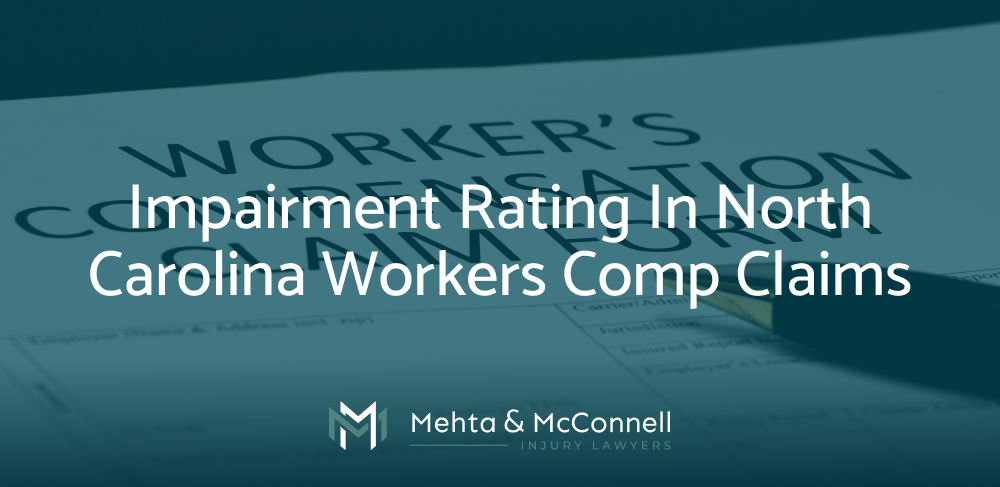
When you’ve suffered a work-related injury in North Carolina, navigating the workers’ compensation process can feel overwhelming. You’re dealing with physical pain, emotional stress, and the challenge of understanding your rights.
One crucial aspect of this process is the impairment rating, which significantly determines the benefits you may receive.
But what exactly is an impairment rating for workers’ comp, and how does it impact your workers’ compensation claim?
What Is an Impairment Rating for Workers’ Comp?
An impairment rating for workers’ comp is a medical determination to assess the extent of your permanent injury after you’ve reached maximum medical improvement (MMI).
MMI means that your condition has stabilized and is unlikely to improve significantly with further treatment. The rating is a percentage and reflects the degree of your permanent physical impairment.
In North Carolina, the impairment rating directly influences the benefits you can receive for permanent partial disability (PPD).
This rating quantifies how much your injury has impaired your ability to function, determining the compensation you’re entitled to under the workers’ comp impairment rating scale.
Impairment Rating for Workers’ Comp: How Claims Are Affected
Your impairment rating is crucial because it helps calculate the duration and amount of PPD benefits. North Carolina workers’ compensation laws specify how many weeks of benefits are available for certain body parts based on the workers’ comp disability rating impairment rating chart.
For example, the law might stipulate that the loss of use of an arm entitles you to up to 240 weeks of compensation. Your impairment rating determines what percentage of those weeks you will actually receive.
For instance, if you receive a 20% impairment rating for an arm injury, you may be entitled to 20% of the 240 weeks of benefits, which equates to 48 weeks of compensation.
Factors Influencing Your Impairment Rating for Workers’ Comp
Several factors can influence the impairment rating you receive, and understanding these can help you better prepare for your workers’ comp claim.
These factors include the severity of your injury, the effectiveness of your treatment, and how your injury impacts your ability to perform your job and daily activities.
It’s important to recognize that impairment ratings are not solely about the physical damage but also how it affects your life.
Additionally, the experience and expertise of the doctor evaluating your injury can significantly affect your impairment rating. Different medical professionals may interpret your condition differently, leading to variations in the ratings.
This is why it’s essential to have an experienced workers’ compensation attorney who can ensure that your impairment rating accurately reflects your situation.
The Importance of Accurate Impairment Ratings
Accurate impairment ratings are critical because they may influence your workers’ compensation benefits.
However, determining the correct rating can be complex and often requires a skilled attorney’s knowledge. This complexity is why reliance on tools like an impairment rating payout calculator can be misleading.
These calculators often fail to account for the many nuances of a workers’ comp claim, including your overall medical condition, the specific nature of your work, the loss of wage-earning capacity, and the potential for future medical needs.
It’s important to remember that your impairment rating is not the final word. If you believe your rating does not accurately reflect your level of impairment, you have the right to seek a second opinion.
Consulting with an experienced workers’ compensation attorney, like those at Mehta & McConnell, can help ensure that your rating and subsequent compensation are fair and just.
The Workers’ Comp Impairment Rating Scale in North Carolina
North Carolina’s workers’ compensation system uses an impairment rating scale to standardize the evaluation of permanent injuries.
This scale is part of the workers’ comp impairment rating chart used by doctors and legal professionals to determine the severity of your injury.
The higher the rating, the more significant your impairment and the more compensation you may be entitled to.
However, the scale and charts are not always straightforward. They require interpretation, and in many cases, they do not adequately reflect the true impact of an injury on your life and livelihood.
That’s why having a knowledgeable attorney by your side is essential. They can advocate for a fair rating that truly represents your situation and fights for the compensation you deserve.
The workers’ compensation process in North Carolina is complicated, and the implications of your impairment rating are significant.
Relying on an impairment rating payout calculator or attempting to navigate the workers’ comp disability rating impairment rating chart on your own can result in receiving less compensation than you deserve.
An experienced workers’ compensation attorney understands how to interpret these ratings, challenge unfair evaluations, and advocate for your rights. Furthermore, you are entitled under North Carolina law to receive a second opinion on your rating.
An experienced workers’ compensation attorney can help you find a doctor for your second opinion. At Mehta & McConnell, we have extensive experience helping injured workers in North Carolina receive the benefits they are entitled to under the law.
Conclusion: Protect Your Rights with Mehta & McConnell
Understanding your workers’ comp impairment rating and how it affects your claim is essential for securing fair compensation. The process can be complex, and errors can have long-term consequences.
That’s why consulting with a knowledgeable workers’ compensation attorney who can guide you through the process and ensure your rights are protected is crucial.
If you or a loved one is dealing with a work-related injury and an impairment rating in North Carolina, don’t leave your future to chance. Reach out to Mehta & McConnell today.
We’re here to provide the compassionate, expert legal support you need to navigate your workers’ comp claim and secure the benefits you deserve.

